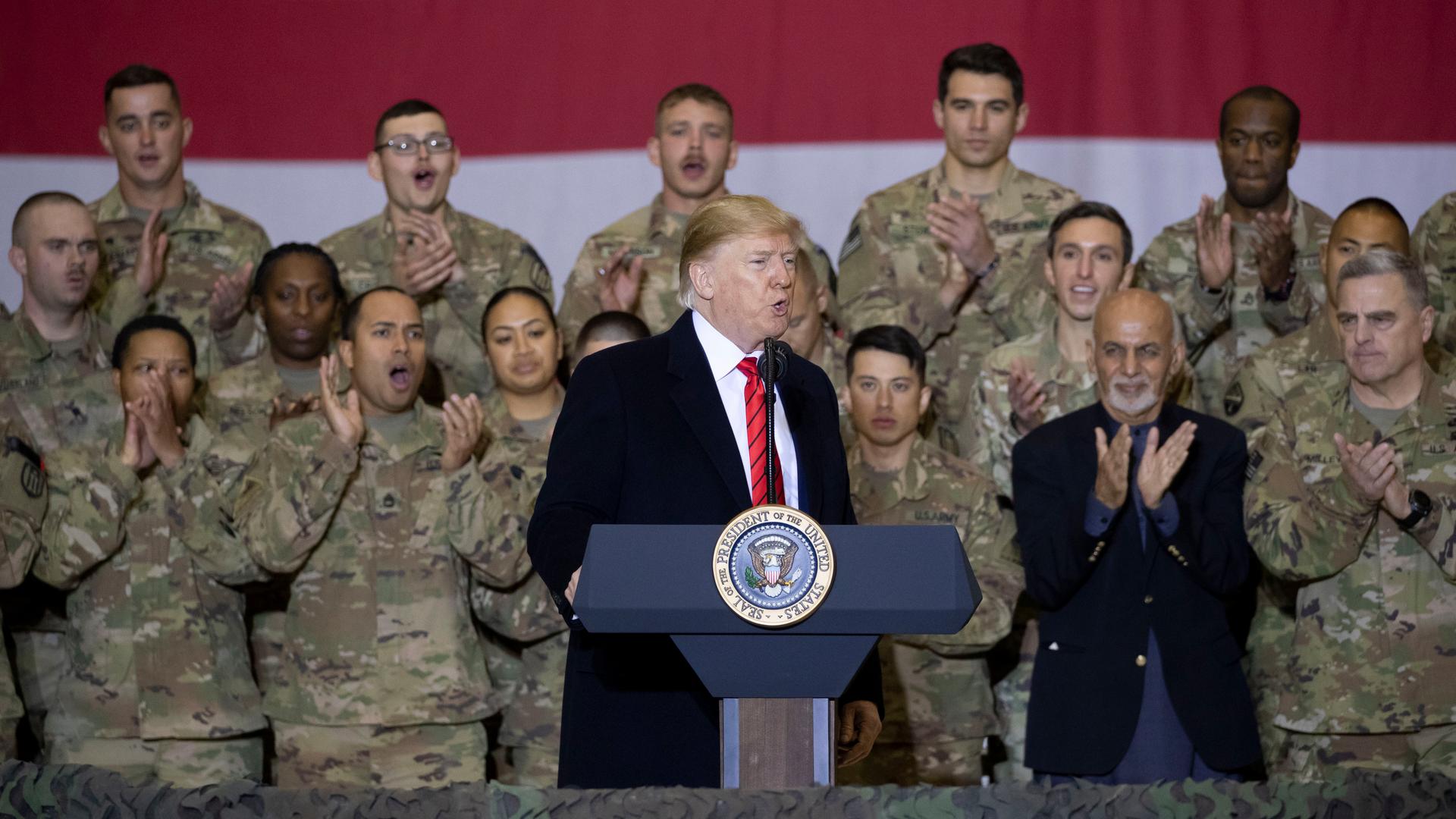US President Donald Trump’s surprise visit to Afghanistan was a cutting image of how President Ashraf Ghani’s government has become an afterthought.
Last week, US President Donald Trump made his very first visit to Afghanistan. In the middle of the night, he reached Bagram Air Base to join his troops for Thanksgiving.
While Kabul was sleeping, the Afghan President Ashraf Ghani headed to Bagram to meet Trump too, finally. Since Trump took over the White House, he has not been keen on meeting Ghani. However, there’s a first time for everything. But in this case, it appeared to be bad timing for Ghani himself.
The Afghan President was standing between Trump and his soldiers in his very own country. He held a short speech that was not just fawning but in fact a total submission to the United States and its ongoing ‘War on Terror’. At the same time, Trump didn’t seem at all interested in what Ghani’s had to say and sent him to the back amidst the soldiers.
Trump made it clear that he wanted to restart peace talks with the Taliban – words that should be considered a slap in the face of the Kabul government.
Lest one forget, the talks between the Americans and the Taliban in Qatar, excluded the Afghan government, undermining them in the process. Ghani’s officials regularly expressed their outrage on this issue and appeared satisfied after Trump cancelled talks in September via Twitter.
During the visit, the hierarchy was obvious. Trump did not visit Ghani in the presidential palace. Instead, it was Ghani visiting Trump at an American airbase, notably one that has become infamous for the abuse, murder and torture of detainees since the beginning of the US invasion in late 2001.
Last but not least, Ghani was alone. No ministers, advisers or Afghan security forces were in attendance.
Indeed, Afghan history will not forget this.
By visiting Trump in Bagram, Ghani strengthened the narrative that he is nothing more than an “American puppet” – a narrative not only spread by the Taliban but also by many other critics of the American war in Afghanistan.
However, even Ghani’s predecessor Hamid Karzai, who came to power after the US invasion and faced similar slurs, knew better. When Barack Obama made a similar surprise trip to Bagram in 2014, the then Afghan President did not visit him at the airbase but made clear that he would only host him in his palace.
At the time, the Americans pushed Kabul to sign a Bilateral Security Agreement (BSA), a deal rejected by Karzai who developed an anti-American stance during the time, regularly talking about US war crimes and Afghanistan’s whittled sovereignty.
When Ashraf Ghani became president a few months later, he immediately signed the deal with the Americans. Critics consider the BSA as a continuation of the war. Among other things, it also all but guarantees the impunity of US soldiers and the preservation of US military bases.
While Karzai knew that his countrymen would not forgive him such a step, and nationalist historians would probably describe him as a “second Shah Shuja”— based on Emir Shah Shuja Durrani who was installed by the Brits in the 19th century in Kabul — Ghani, a Western-educated technocrat, immediately satisfied those who brought him to power.
One can argue that the Afghan President was not elected in 2014 but selected by then Foreign Secretary John Kerry after a problematic runoff between him and his closest rival Abdullah Abdullah.
While the outcome of the most recent election is still unclear, at least one thing appears to be clearer than ever. When it comes to peace talks with the Taliban, the Afghan President has become an irrelevant player for both Washington and the insurgents – a fact that has become even more clear after Trump’s visit.
From the very beginning, the Kabul government did not play a role in the peace negotiations with the Taliban in Qatar. Many observers considered this as problematic, and for good reason. After all, Ghani’s government is officially recognised globally and represents Afghanistan at every political stage, including the United Nations. One can even argue that the Kabul government speaks for at least a portion of the Afghan people, albeit a minor, corrupt and privileged class.
Kabul has turned into a tiny dystopia only accessible to the corrupt elite whose families live in safety abroad. Most of these people will likely leave themselves, thanks to their dual citizenships, once their lucrative contracts expire. This class of Afghan is entirely out of touch with ordinary Afghans, and Ghani has found himself in the extraordinary position of not only becoming irrelevant to ordinary Afghans, but also to those who have brought him to power.
Author: Emran Feroz
Emran Feroz is an independent journalist, author and the founder of Drone Memorial, a virtual memorial for civilian drone strike victims. His work has appeared with The New York Times, Al Jazeera, The Atlantic, The Hindu, Alternet and several other media outlets. He is also a regular contributor to German-language newspapers and magazines.
Source










Discussion about this post